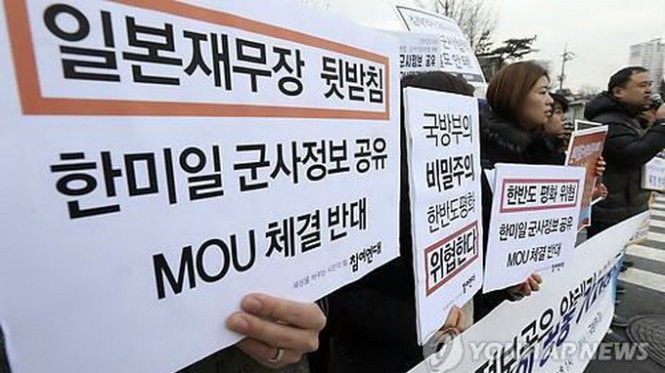Can the US, Japan and South Korea deal more effectively with North Korea?
(Baonghean.vn) - The US, South Korea and Japan have just signed the first intelligence sharing agreement among the three countries to share “sensitive” information about missile tests and nuclear programs of the Democratic People’s Republic of Korea. Experts have now questioned the effectiveness of this agreement as North Korea has always been a “difficult target” for the intelligence forces of all three countries – even if they are joined together, while the agreement could increase tensions on the Korean peninsula.
 |
| South Korean public opinion opposes the increase in tensions on the Korean peninsula. |
For a long time, the intelligence agencies of the United States, South Korea and Japan have been assessed as having failed to grasp the clues about important events taking place in North Korea. In addition to the sensational incident of the death of leader Kim Jong-il, a series of other moves by North Korea related to its nuclear program have also "evaded" the dense and formidable intelligence system of foreign intelligence agencies, including the United States - Japan - South Korea. The two most typical incidents are that North Korea secretly built a uranium enrichment plan for about a year and a half without being detected until North Korean officials announced the program in late 2010; and second, last year, a Stanford University scientist was allowed to visit a North Korean nuclear facility located in the middle of the Yongbyon complex, which is regularly monitored by US spy satellites – a story that raises the question of why US satellites could not detect such a large construction project at this complex? The series of failures of the US-Japan-South Korea alliance intelligence continued after Kim Jong-un took power, when most of the predictions about the leader's decisions were completely different from reality. According to US intelligence predictions, Kim Jong-un would prioritize economic development over military investment. However, reality has proven otherwise with a series of missile tests that North Korea has conducted in the past two years.
In addition to the need to improve the quality of intelligence information to respond more promptly, the signing of the intelligence sharing agreement by the three countries of the US, Japan and South Korea is also believed to be to deal with concerns about North Korea's nuclear and missile programs. North Korea has repeatedly threatened to launch nuclear attacks on Washington and Seoul, most recently in connection with a UN resolution on human rights in North Korea and a fictional comedy film about the assassination of leader Kim Jong-un produced by the US film studio Sony Pictures. Under the intelligence sharing agreement, South Korea will transfer security information to the US - a legal responsibility under a joint military-security information agreement signed earlier between the US and South Korea. The US will then transfer information received from South Korea to Japan. The three countries, the US, Japan and South Korea, believe that this approach will help them respond more quickly to threats from North Korea's missile and nuclear programs, thereby taking more effective preventive actions. Previously, the US had separate, bilateral intelligence-sharing agreements with South Korea and Japan - two allies that host US military bases. However, South Korea and Japan themselves do not have similar bilateral agreements related to the long-standing historical disputes between the two countries. In 2012, the two countries discussed the first bilateral intelligence-sharing agreement, but the signing was canceled at the last minute due to South Korea's objections.
Although it is expected to help the US-Japan-South Korea alliance respond more quickly to developments from North Korea, there are still many challenges in the exchange of intelligence between the three countries. According to experts, the lack of trust and consensus between the two members, Japan and South Korea, is the weakest point in this combination. Currently, the relationship between Japan and South Korea is still at its lowest level in many years due to disagreements related to the period when Japan stationed troops on the Korean peninsula in the period 1910-1940. In addition, along with China, South Korea is also a country with a sovereignty dispute with Japan and has expressed deep concern when Japan wants to revise the Peace Constitution. Even in the recently signed intelligence sharing agreement, the exchange of information between Japan and South Korea, carried out through the US, has shown that there is still a huge gap in bilateral relations, even though both countries have a common concern about North Korea. Therefore, whether the US can play the role of “glue” to make the 3-country intelligence alliance work smoothly is still a big question mark. In addition, opposition within South Korea is also considered a barrier for this country to be “wholehearted” in the common mission. According to civil organizations in South Korea, they oppose the signing of this intelligence sharing agreement because of concerns that tensions will increase in the region, and at the same time, it may lead to South Korea participating in the US-led missile defense system.
Increasing tensions in the region is not only a concern of the Korean public but also of the international community in general. Considered a major player in the peace process on the Korean peninsula, China has also indirectly expressed its concern about the US-Japan-Korea move, stating that the relevant parties should "do things that are beneficial to building mutual trust and promoting stability on the Korean peninsula instead of taking actions that cause distrust". Surprisingly, despite public speculation about the effectiveness and potential risks of the US-Japan-Korea intelligence alliance, North Korea has yet to react. Is this North Korea's way of showing confidence in its ability to protect its secrets from foreign intelligence networks? Breaking this confidence is perhaps the biggest challenge for the US-Japan-Korea intelligence community after joining hands.
Thuy Ngoc






